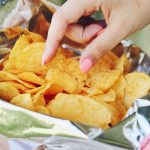Why young women are getting bowel cancer at alarming rates, researchers reveal
 (NaturalHealth365) Something unexpected is happening. Colon cancer is rising dramatically in people under 50. For decades, colorectal cancer was an older person’s disease. Now, young women are being diagnosed at rates that have researchers alarmed.
(NaturalHealth365) Something unexpected is happening. Colon cancer is rising dramatically in people under 50. For decades, colorectal cancer was an older person’s disease. Now, young women are being diagnosed at rates that have researchers alarmed.
A major new study just published in JAMA Oncology found that women under 50 who regularly eat ultra-processed foods have a 45 percent higher risk of developing bowel polyps – abnormal growths that can become cancerous.
Over 24 years, researchers from the Nurses’ Health Study II followed nearly 30,000 women. The findings were stark. Those consuming the most ultra-processed foods were significantly more likely to develop early-onset conventional adenomas – the type of polyps that can transform into cancer over time.
What’s actually in ultra-processed foods?
Ultra-processed foods are engineered products packed with emulsifiers, artificial sweeteners, preservatives, and additives designed to maximize shelf life and profit – not your health.
The women in the study were eating about 5.7 servings of ultra-processed foods daily. That’s roughly one-third of their total daily calories. The culprits? Breads, breakfast cereals, sauces, spreads, condiments, and especially sugary drinks.
The researchers noted something specific: artificially sweetened drinks were driving much of the increased risk. These beverages are often consumed multiple times daily, by millions of young women who think they’re making a “healthier” choice by choosing diet soda over regular.
Here’s what’s happening at the cellular level: these additives are impairing your gut barrier function and altering your microbiome. That’s the community of bacteria that protects your intestines and supports your immune system. When that barrier breaks down, inflammation increases, and chronic inflammation is where cancer begins.
Why young women?
The increase in early-onset colorectal cancer is so unusual that it prompted the global research initiative Cancer Grand Challenges to investigate. Why are young people, particularly young women, suddenly at risk for a disease that used to primarily affect older adults?
The timeline is revealing. Consumption of ultra-processed foods has exploded over the past 30 years. The rise in early-onset colorectal cancer follows almost exactly behind it.
Researchers also found that women with higher ultra-processed food intake had higher BMI, smoked more, had higher rates of type 2 diabetes, and were less physically active. But the association between ultra-processed foods and polyp development remained significant even after accounting for these factors. The food itself was a direct risk factor.
Natural solutions to reduce your risk
If you’re eating ultra-processed foods regularly, changing this is one of the most powerful cancer-prevention strategies available.
Eliminate artificially sweetened drinks immediately: These are directly linked to increased adenoma risk. Switch to filtered water, organic herbal tea, or sparkling water with organic lemon.
Rebuild your gut microbiome: Fermented foods like organic sauerkraut, kimchi, and kefir restore beneficial bacteria. Fiber from whole organic vegetables and fruits feeds these protective organisms.
Prioritize whole foods: Organic vegetables, wild-caught fish, 100% grass-finished meat, organic legumes, nuts, and seeds should comprise 90 percent of your diet.
Reduce inflammation naturally: Turmeric, ginger, wild-caught salmon rich in omega-3s, and organic dark leafy greens actively reduce the inflammatory cascade.
Support liver detoxification: Your liver processes toxins from food additives. Milk thistle, cruciferous vegetables, and adequate water support this critical system.
Increase fiber strategically: Soluble fiber from organic berries and vegetables feed the good bacteria. Insoluble fiber from vegetables supports bowel regularity.
Why cancer prevention starts with your fork
Cancer Research UK estimates that over half of bowel cancer cases in the UK are preventable through lifestyle changes. That means the power is literally in your hands every time you eat.
The science is clear: reducing consumption of ultra-processed foods is one of the most effective strategies for avoiding cancer.
Ready to understand the deeper strategies for stopping cancer before it starts? Jonathan Landsman’s Stop Cancer Docu-Class features 32 presentations from leading holistic doctor and holistic healthcare experts revealing how diet directly triggers cancer development and what you can actually do about it.
Discover the foods feeding cancer cells; the hidden toxins in everyday products; and the proven natural protocols for avoiding and reversing early cancer markers. Order today and own all 32 presentations plus 17 bonus videos, transcripts, and action guides.
Sources for this article include:



